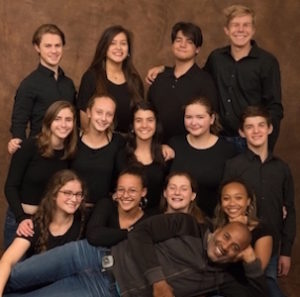Although a cappella is technically defined as singing without instrumental accompaniment, many a cappella singers use their voices to create instrumental textures when they rehearse and perform to create a multilayered musical experience for themselves and their audiences.
Once everyone in a group learns their part, individually, the next level of work begins, that of weaving these individual parts together into an evolving blended, balanced, dynamic tapestry of sound. Though each member of an a cappella group can learn and practice their parts on their own, the aforementioned weaving has to be done together.
That’s the challenge that’s faced `Til Dawn, Youth in Arts’ award-winning a cappella group. Though the 15-member ensemble typically meets twice a week to practice, they last rehearsed together in person on March 11.
When the shelter in place order resulting from the coronavirus pandemic was issued, the members of `Til Dawn, like everyone else in the Bay Area, have been stranded at home, forcing the cancellation of all of their spring shows, auditions for new members and the cancellation of their annual spring concert.
Suffice it to say, there’s simply no way to do a lot of what the group had been doing.
“There is no way to rehearse that allows us to sing together, real-time, and hear each other,” said longtime Director Austin Willacy. “Variations in wifi access and speed create lags that make it impossible to sing together through Zoom. Truth be told, though we’re a singing group, we spend as much of our time listening as we do singing. Learning to listen to each other while singing, to navigate our individual voice’s proper place as we’re performing, is the most important part of what we do at rehearsal. It’s an ongoing dance of stepping forward and stepping back,” he said.
When they first met online, because of time lags, Willacy was only able to work with one singer at a time – which was very inefficient as it left the other members of the group waiting for their turn. At in-person rehearsals, although individual support is available as needed, the group typically learns new music by voice part; the sopranos all learn the soprano part together, etc.
Recognizing how draining that amount of waiting while glued to a screen could be, Willacy quickly adjusted, shortening rehearsal time by 30 minutes and splitting the group into four songwriting groups based on their self-assessed comfort/experience with songwriting. The check-ins, which are a longstanding attuning process at the beginning of rehearsal, have continued to allow the group to stay connected with each other as much as possible. The music-focused time in `Til Dawn rehearsals is now evenly split between rehearsal and review of existing repertoire and songwriting.
The members of `Til Dawn have been nimble and creative in finding ways to use technology to support their songwriting. One member sang her melody to a friend over the phone (he recorded a track with instruments and sent it back). Another downloaded free beats from a website. Several members play the ukulele, saxophone, guitar and other instruments and have been using those while composing.
Willacy said exploring songwriting has been an unexpected benefit for `Til Dawn members confined to home.
“I’ve been deeply struck by the level of songwriting talent in this group,” he said “I’ve also been inspired by the level of creativity, trust, and willingness to try on something new.”
For the Youth in Arts’ COVID relief fund, `Til Dawn has prepared a special video and song. To make it possible, Willacy laid down a basic piano part to a click track and received an iPhone-recorded guide vocal. After combining them, he sent an MP3 to the group members so they could listen to it in earbuds while recording their respective parts. They recorded themselves (singing mostly on their phones) and sent their audio files back to Willacy, who painstakingly edited them all together, then providing that recording to the song’s lead vocalist, Anna McShea, who was able to perform and record her own vocal in Ableton, a music recording app.
The teens also furnished video of themselves singing along to the track to Youth in Arts Program Director Kelsey Rieger, who is compiling the individual video into a video of the whole group. Watch this wonderful performance here!
Willacy, a renowned performer who travels worldwide as a solo artist and with the pioneering a cappella group, The House Jacks, said he’s been able to stay in the creative flow despite the quarantine. He’s written or co-written at least four songs and mixed and edited several more.
“I’m really lucky to have a studio at home,” he said. “It’s a huge privilege that feels even bigger right now. Being creative helps me stay present.”

